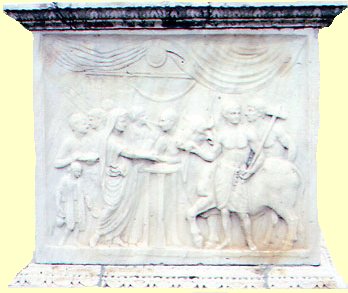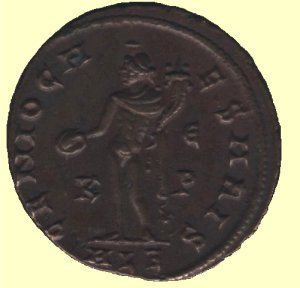
A Genius has nothing to do with intellect but is rather a spirit or personal guardian. The Genius was originally one of the family spirits of the household who represented the male lineage, the 'manhood' of the family, his domain was among others the ability to father children. Given the prominence men enjoyed within the Roman family, the Genius was seen as a spirit of some considerable importance to the household. Every man had a Genius which was given to him by birth and which stayed with him till the grave. The Genius always endeavored to guide him to happiness, because of this Romans spoke of indulging or cheating ones genius as one either enjoyed himself or failed to do so when the opportunity arose. A man’s birthday was the natural occasion for honoring ones Genius, and offerings to his Genius were made. Women had their own Genius, which was called a Juno. The Juno was the protector of women, marriage and birth.

Later the Genius changed into a more
general guardian spirit, the gods had a Genius (the Genius of Jupiter for example,
Jovis Genio) and a Genius also came to protect groups of people and their places
of activity such as theaters, baths, stables, streets, and markets.
Examples of genii (plural) would be:
Genio
Antiocheni the Genius of Antioch.
Genio
Augg et Caesarum the Genius of the Emperors and Caesars.
Genio
Imperatoris the Genius of the emperor
Genio
Populi Romani the Genius of the Roman people.
Genius
Senatus the Genius of the senate.
The emperor also had a Genius which was worshipped rather then the person of the emperor himself, the emperor couldn't call himself divine while he was still alive and encouraging the worship of his Genius was a nice way around this. Augustus established a religious office called the Augustales, they were attendants of the cult of the emperor's genius. More importantly freedman, who were barred from holding any political office at the Roman or local level, could hold (and the wealthiest of them were indeed the main holders of) the office of Augustales. This allowed them to join the local urban elite and improve the chances of their sons, who could hold political offices. For the Romans it was common practice to swear by the Genius of the emperor, and anyone who swore falsely could be punished. One of the more important Genius' was the one of the roman people as a whole, Genius Publicus Populi Romani which had a shrine dedicated to him near the temple of Concord in the Forum. The local Genius was usually represented by a serpent, the symbol of the fruitfulness of the earth and of perpetual youth. Hence snakes were kept in houses and their death would have been considered an ill omen. The personal Genius usually appeared as a handsome youth in a toga or cape, with his head sometimes veiled and sometimes bare, carrying a patera and cornucopia, frequently in the position of offering sacrifice.
